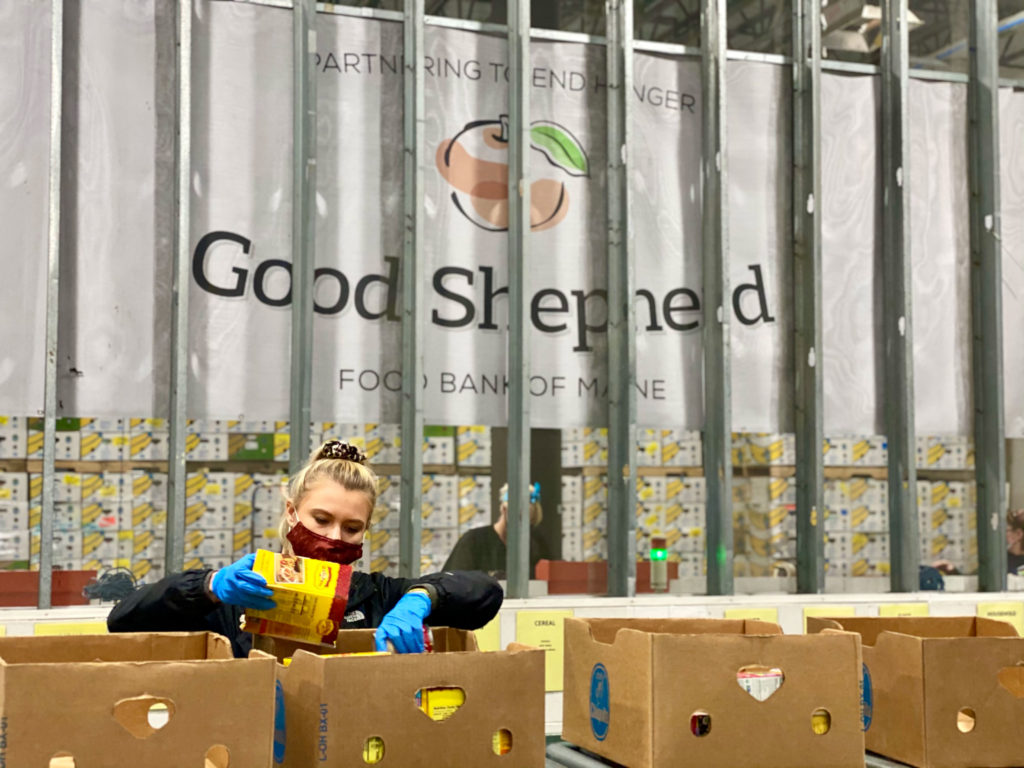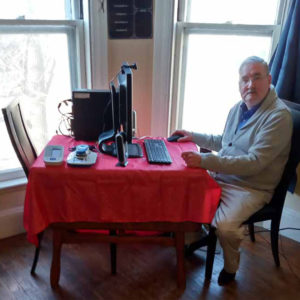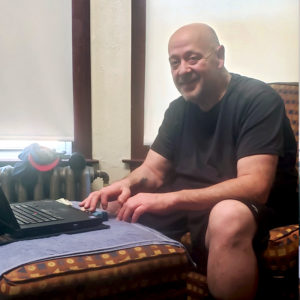This is the second in a series of four blog posts that we’re doing with partners at Good Shepherd Food Bank, give IT. get IT., The Opportunity Alliance, National Digital Equity Center, and Maine Community Foundation to help highlight and deepen our understanding of the ways that our education, our elders, our health and food security are all affected by a lack of affordable, equitable access to internet in Maine communities.
I was pretty proud of myself when I joined Good Shepherd Food Bank’s board of directors. At the time, I thought an essential action Maine’s largest hunger-relief organization needed to do was extend the proverbial ‘hand up’ to people struggling after losing a job or leaving a bad relationship and were visiting food pantries for help.
Six years later, the biggest thing I’ve learned about Maine’s food insecurity is that most of the people who visit one of the Food Bank’s partner agency food pantries aren’t “going through a tough time.” They’re battling cyclical poverty.
What does that mean?
There’s no singular definition, but for many, cyclical poverty means living in a small, rural town and working multiple minimum wage jobs. It means barely having enough money to pay your rent, heat your home during the winters, or afford life-saving medications, hence the chronic need for support from food pantries and state/federal-funded services, like WIC and SNAP (food stamps).
In theory, once clients of the Food Bank’s partner agency network have acquired healthy food, they can now develop the skills needed for gainful employment by enrolling in educational courses to help build their resume.
In reality, thousands of low-income Mainers are confronted with another obstacle – lack of access to affordable, reliable Internet service so they can attend online classes to broaden their education to gain the skills needed to apply for jobs.

Tim Keefe is a classic example of how access to technology and high-speed internet are essential to breaking the cycle of poverty. Four years ago, Tim was injured at work and found himself unable to earn a living and unable to qualify for SNAP benefits. After becoming homeless, Veterans Upward Bound helped him secure an apartment and workforce training at Southern Maine Community College (SMCC). Today, Tim is working at the “best job I’ve ever had” as a Materials Handler at Bath Iron Works.
When he first started attending classes at SMCC, Tim used computers and the internet on campus. Today, those same classes Tim took are only available online due to COVID-19. Without a home computer, Tim would have been unable to acquire the skills he needed to land the job at Bath Iron Works, and his cycle of poverty would have continued.
Throughout the state of Maine, thousands of people are facing the same predicament Tim did with no support or guidance from anyone. When you’re struggling to pay your bills, purchasing a computer and signing on for a $70-100 monthly internet bill is a rugged mountain to climb, provided the service is even available where you are living.
Here in Maine, an estimated 85,000 households do not have access to broadband internet of any kind because it is not available where they live. Note, that’s not 85,000 people – that’s 85,000 households. These households may be a single person struggling to acquire new skills or learn about programs that can help them improve their situations. These households may also include children who have been unable to keep up with schoolwork during the pandemic. Finally, these households may consist of one or more senior citizens who are struggling to get by on social security and need ways to stay connected with family members or earn extra income through part-time work.
Not all of these 85,000 households are in poverty, but many are. Without computers, the skills to use them, and access to reliable broadband internet, these households face more significant challenges to break their cycle of poverty.
That’s why for the first time in its 40-year history, Good Shepherd Food Bank is actively supporting a political initiative that has nothing to do with food. Here in Maine, there are a dozen proposed bills before the legislature that address the lack of broadband in our state, as well as $200 million dedicated to broadband in the Governor’s Maine Jobs and Recovery Plan.
Good Shepherd Food Bank supports all these bills for one very fundamental reason: so that our network of over 500 hunger-relief partners can connect clients with more services than just the healthy food they need to thrive.
We believe our partners can help their clients step on the next rung of the ladder out of poverty by linking them with the training and support they need to find better jobs and improve their lives. Our new partnership with give IT. get IT. is making this happen by providing our food pantry partners and their clients computers through their corporate recycling and digital inclusion programs.
The result of the 2019 merger between PC’s for Maine and E-Waste Alternatives, give IT. get iT. is the only certified nonprofit electronics reuse and recycling service in New England. From computers to copiers, businesses like IDEXX, Bangor Savings Bank, Systems Engineering, and Vistaprint hire give IT. get IT. to pick up all of their outdated technology. After destroying all data to R2 International Best Practice Standards, give iT. get IT’s team cleans and upgrades all reusable computers and gives them at low- or no-cost to people in need.
With give iT. get IT. as a resource, our food pantry partners can connect food-insecure people with the food they need today and the technology tools and training they need to end their cycles of poverty tomorrow.
At Good Shepherd Food Bank, we have a bold goal to eliminate food insecurity in Maine by 2025. That means everyone in Maine has access to the healthy food they need to thrive whenever and wherever they need it.
As motivated as we are to see no Mainer go hungry, we’re even more excited to see the day when every person here also has access to the tools and resources they need to go from food insecure to stable, productive, and prosperous. Just as fruits and vegetables are part of every healthy diet, we believe access to broadband internet and digital equity are the building blocks of a rewarding life.
Jim Darroch is a Good Shepherd Food Bank of Maine board member and communications consultant to give IT. get IT. Additional support for this post was provided by Amy Regan Gallant, vice president for public policy and research at Good Shepherd Food Bank.





